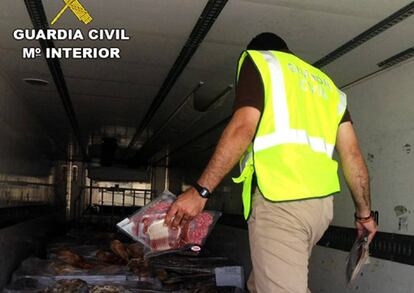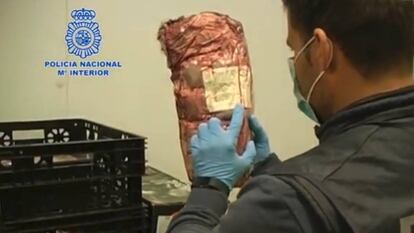Raids in Spain uncover expired meats about to be placed back on the market
In recent weeks police have seized thousands of kilos of ‘jamón’ and other products in several provinces

Spain’s National Police and Civil Guard have seized hundreds of tons of expired jamón and other meat products that were about to be placed back in the market – in some cases, they were already back on sale.
In three separate raids conducted over the course of a few weeks, officers found that individuals and companies were apparently tampering with seals and labels to extend the shelf life of expired food products.
Sources at the Civil Guard and the Health Ministry said that the operations were independent from each other, but that further investigation is being conducted to determine whether there is a link between the cases.

The problem is no longer about lower-quality ham being passed off as gourmet or “pata negra,” a designation used for top pork products. This has been a more or less habitual scam that producers of real Iberian meats have been trying to eliminate through quality regulations established in 2014, as well as seals indicating the animal’s breed and feeding method.
This latest fraud involves taking expired food products that should legally be destroyed, altering their labels, and putting them back on the market.
Back to market
How does expired meat, which must be destroyed by law, reach someone who is planning to put it back on the market? Sources in the meat industry said that the owner of the product is responsible for taking the items out of circulation. This means the producer is to blame if the item was never sold in the first place, or the distributor who was unable to resell it.
The latest raid took place this past weekend in Fuente Vaqueros (Granada), when a patrol flagged down a refrigerated truck during a routine road check. Officers inspected the goods, detected the suspicious meat products, and escorted the driver to his destination: a warehouse containing 10,700 Iberian pork ham legs and cold cuts that were expired and spoiled and whose owners were moving them to a different location.
An inspection of the warehouse revealed “anomalous” labeling, and signs that these had been tampered with, said Civil Guard sources. An EU regulation (1169/2011) sets out the information that must be included on all food labels, including the expiration or use-by date, the origin of the product, and whether it contains any allergens. Investigators are now trying to determine the origin of these products, which have since been disposed of by incineration.
The same sources said that there is no known connection between this case and a March operation that turned up more than 30,000 kilograms of expired frozen meat sitting inside a warehouse in Mallorca, and about to be distributed among schools, hotels and restaurants. A third unrelated raid seized and destroyed hundreds of tons of hams, cold cuts and other expired meat products inside several warehouses in the Valencia and Extremadura regions.
Sources at the Valencia health department said that five businesses have had their licenses revoked and nine more are under “special oversight.” This case led the Spanish Consumer, Food Safety and Nutrition Agency to issue a national alert warning people not to eat products from the following brands: Jamón Bodega Alto de Aitana, Jamón Bodega Sierra Gorda, Aire de Mariola, Serranía de Ameta, El Galán, Jamones Croval, Don Enrique and Oro la Ermita.
The meat industry association ANICE said it is “worried,” but rejected the notion of a criminal network behind these cases. “Those are criminals such as you might find in any sector,” said a spokesperson.
English version by Susana Urra.









































